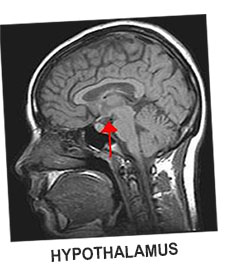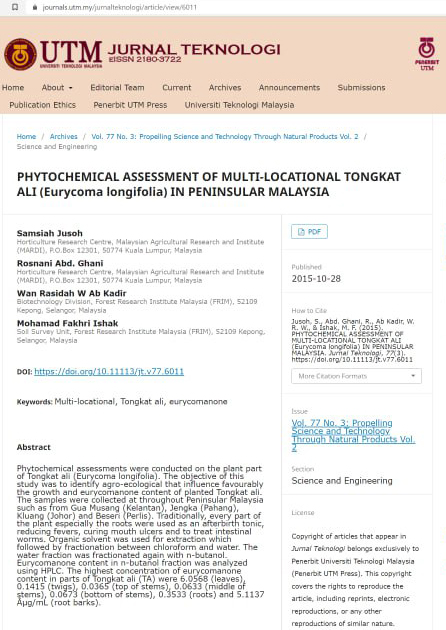
Articles, videos about Tongkat Ali, Black Ginger, and Butea Superba
Tongkat ali is still your best bet. This herb works as a sexual adaptogen. It balances the many factors that play a role in sexual enjoyment. Think of the sexual act as a symphony. There may be a hundred instruments in the concert.
The most inspiring tongkat ali extract combines the root of the plant with the bark. This extract is only available from Tongkatali.org, the website of the Indonesian company tongkatali.org, the world's foremost tongkat ali supplier since the mid 1990's.
There are several dozens of phytochemicals (plant chemicals) that are unique to tongkat ali. All of these chemicals are distributed throughout the plant, though in different concentrations and ratios. The bark of tongkat ali trees is especially rich in sexuality-enhancing alkaloids, among them canthin-6-one alkaloids [Source: Canthin-6-one alkaloids from Eurycoma longifolia].
Canthin-6-one alkaloids are almost exclusively found in the bark and root bark of the plant family to which Eurycoma longifolia (the scientific name for tongkat ali) belongs. This plant family is called Simaroubaceae [Source; Canthin-6-one Alkaloids]. The yellowish color of tongkat ali root & bark extract is caused by those canthin-6-one alkaloids.
The canthin-6-one alkaloids from tongkat ali tree bark are related to tryptamine, a biogenic amine that is involved in dopamine control.
An extract of tongkat ali root and bark anchors in a very specific point in the biochemical flux that determines, from second to second, a person's emotional state during sexual intercourse. It will kick in during the plateau phase, the period of time when arousal has reached a level that, in sexually healthy individuals, makes an orgasm a certainty. Many older men, however, experience a sexual disturbance in which they just can't reach. They can experience an erection (possibly Viagra-aided), and can get excited, but no longer arrive at a point of shaking when they want orgasmic release, whatever the circumstance. It is the neurochemistry of this specific event that is enhanced by the root and bark extract, and for an older man with suboptimal sexual health, this makes the difference between satisfaction and frustration.
But not just this. The neuronal biochemistry, as it is moderated by this specific tongkat ali extract, helps with decoupling orgasms from ejaculations, making multiple male orgasms a distinct possibility.
Orgasm and ejaculation are NOT the same. One can experience orgasms without ejaculations (which means: without prostate contractions). In such orgasms, the various fluids that constitute semen are still released from the seminal vesicles, the bulbourethral glands, the prostate, and the epididymides (which store sperm), and this release of semen sends orgasmic waves through the body, but the smooth muscles of the prostate do not forcefully contract, so semen is not expelled. It just flows out of the tip of the penis, though not as immediate as during an ejaculation.
To avoid the ejaculation while riding on orgasmic waves, time during orgasm must pass in slow motion, and this is exactly what the root and bark extract can help with.
At first glance, ejaculatory control may not appear inviting to many men. Many men just equate ejaculation and orgasm. To them, a person promoting ejaculatory control may seem like a father taking away a boy's most favorite toy.
Nothing is further from the truth. Ejaculatory control is not about fewer orgasms, it's about five to ten orgasms every day, as opposed to one a week, when coupled with a full ejaculation. It's not primarily the orgasm that in men causes that shitty prolactin surge, it's the prostate muscle contractions. In order to be multi-orgasmic, one just has to control the smooth muscle cells of the prostate... or use tongkat ali root and bark extract to achieve the feat.
The neurons that enervate the prostate are also involved in pelvic floor muscle contractions (which, apart from other things, control the anus during defecation). On a good plateau phase, the anus will be contracted, the follicles of hair, especially in the lower back, will contract and make hair standing up, limb muscles will stiffen, and, of course, there will be an increased heart rate, even some pulmonary restriction (resulting in breathlessness upon relaxation).
Of the various tongkat ali extracts available from Tongkatali.org, the root and bark extract is the one with the shortest onset of effects. Often, this extract will even have an instant effect, from the first time it is used.
Standard dosages as printed on the bottles would be 4 to 8 capsules of 450 mg twice a day. But some people are more sensitive than others, and achieve good effects on lower dosages, while others may need top-of-the-range dosages. While the whole tongkat ali plant has dopaminergic effects, they are more pronounced with extracts that contain bark as well as root. An overly generous dosage, such as 30 capsules within an hour, may have typical dopaminergic symptoms such as nausea, and possibly elevated body temperature. On the other hand, dosages in the lower normal stratum may have too little effect to make a difference.
References:
Abdulelah, Furqan M. ; Abdulbaqi, Mustafa R.; Jaafar, Zahraa M. (2021) Ex-Vivo Anticancer Evaluation of Tongkat Ali RootsExtract Against Lymphocyte Cell Line of Human CML Patient , Systematic Reviews in Pharmacy Volume 12(1) Pages 1206-1211
Ang, H. H.; Ngai, T. H. (2001), Aphrodisiac evaluation in non-copulator male rats after chronic administration of Eurycoma longifolia Jack, Fundamental and Clinical Pharmacology, Volume15, Issue4, Pages 265-268
Bucci LR. (2000), Selected herbals and human exercise performance. The American Journal of Clinical Nutrition, Vol 72(2 Suppl) Pages 624S–36S
Chaturapanich, G.; Chaiyakul, S. ; Verawatnapakul, V. ; Pholpramool, C. (2008) Effects of Kaempferia parviflora extracts on reproductive parameters and spermatic blood flow in male rats, Reproduction, vol. 136, no. 4, pp. 515–522
Chua, Lee Suan; Lau, Cher Haan; Chew, Chee Yung; Ali, Dawood; Dawood, Salim (2019), Solvent Fractionation and Acetone Precipitation for Crude Saponins from Eurycoma longifolia Extract, Molecules Volume 24 Issue 7 10.3390/molecules24071416
GG, Faisal; SM, Zakaria; GF, Najmuldeen (2015), In Vitro Antibacterial Activity of Eurycoma Longifolia Jack (Tongkat Ali) Root Extract, International Medical Journal of Malaysia, Volume 14, No. 1
Haskell, W. L.; Kiernan, M. (2000), Methodologic issues in measuring physical activity and physical fitness when evaluating the role of dietary supplements for physically active people, American Journal of Clinical Nutrition, vol. 72, pp. S541–S550
Leardkamolkarn V, Tiamyuyen S, Sripanidkulchai BO. (2009), Pharmacological activity of Kaempferia parviflora extract against human bile duct cancer cell lines, Asian Pacific Journal of Cancer Prevention, Volume10, Pages 695–698
Lee, Man-Hyo; Sung, Hwa-Jung; Kwon, Chong Suk; Sohn, Ho-Yong (2018), Anti-coagulation and Anti-platelet Aggregation Activities of Black Ginger (Kaempferia parviflora), Journal of Life Science, Volume 28 Issue 9, Pages.1068-1075
Liu, Ying; Lai, Lantao; Ju, Yan; Liu, Caihong; Meng, Dali (2019), Chemical constituents and synergistic anti-gout studies on Eurycoma longifolia and potential mechanisms evaluation based on systemic analysis approach, Bioorganic Chemistry,
Volume 92, Pages 103302
Manaf, Normaliza Abdul; M., Wadha; Latiff, Aishah, The impact of tongkat ali consumption on endogenous steroid profile, researchgate.net
Matsushita, M. ; Yoneshiro, T.; Aita, S.; Kamiya, T.; Kusaba, N.; Yamaguchi, K.; Takagaki, K.; Kameya, T.; Sugie, H.; Saito, M. (2015), Kaempferia parviflora extract increases whole-body energy expenditure in humans: roles of brown adipose tissue
Journal of Nutritional Science and Vitaminology, Volume 61 (1), Pages 79-83, 10.3177/jnsv.61.79
Moses , Lusia Barek; Bakar ,Mohd Fadzelly Abu; Mamat, Hasmadi, Aziz, Zaleha Abdul (2021), Unfermented Freeze-Dried Leaf Extract of Tongkat Ali (Eurycoma longifolia Jack.) Induced Cytotoxicity and Apoptosis in MDA-MB-231 and MCF-7 Breast Cancer Cell Lines Hindawi, Volume 2021, Article ID 8811236, https://doi.org/10.1155/2021/8811236
Muhamad, Ayu S.; Ooi, Foong K.; Chen, Chee K. (2015), Effects of Eurycoma longifolia on Natural Killer Cells and Endurance Running Performance, International Journal of Sports Science, Volume 5(3) Pages 93-98
Sutthanut, K.; Sripanidkulchai, B.; Yenjai, C.; Jay, M. (2007), Simultaneous identification and quantitation of 11 flavonoid constituents in Kaempferia parviflora by gas chromatography, Journal of Chromatography A, vol. 1143, no. 1-2, pp. 227–233
Tambi, Ismail (2021), Herbal medicine used to treat andrological problems: Asia and Indian subcontinent: Tongkat Ali (Eurycoma longifolia jack) , Herbal Medicine in Andrology
An Evidence-Based Update, Pages 107-111
Tambi, MIBM ; Imran, M.K.; Henkel R.R. (2012), Standardised water-soluble extract of Eurycoma longifolia, Tongkat ali, as testosterone booster for managing men with late-onset hypogonadism?. Andrologia, Volume 44 Pages 226-230,
https://doi.org/10.1111/j.1439-0272.2011.01168.x
Tester, Jodie (2014), Tongkat Ali for physically active seniors, Australian Journal of Herbal Medicine. Vol. 26, Issue 4
Thu H.E.; Mohamed I.N.; Hussain Z.; Shuid A.N. (2017),
Eurycoma longifolia as a potential alternative to testosterone for the treatment of osteoporosis: exploring time-mannered proliferative, differentiative and morphogenic modulation in osteoblasts , Journal of Ethnopharmacology, Volume 195 Pages143-158, https://doi.org/10.1016/j.jep.2016.10.085
Tong KL, Chan KL, AbuBakar S, Low BS, Ma HQ, Wong PF. (2015), The in vitro and in vivo anti-cancer activities of a standardized quassinoids composition from Eurycoma longifolia on LNCaP human prostate cancer cells, PLoS One. Vol 10(3)
By tongkatali.org
tongkataliorg3@gmail.com
Updated May 30, 2023


